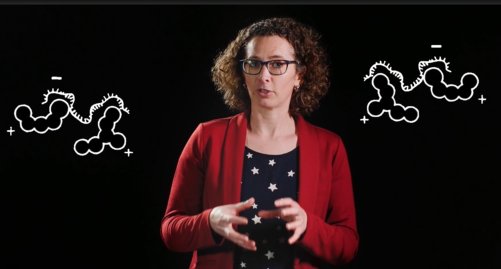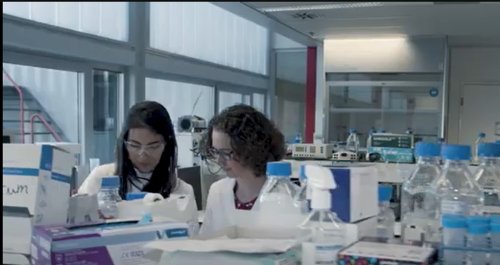Saskia Lindhoud is an adjunct professor at the Department of Molecules and Materials at the University of Twente. She studied Molecular Sciences at Wageningen University and obtained a PhD degree in Physical Chemistry and Colloid Science in 2009. She then did an industrially oriented post-doc at the University of Bath in the UK, where she used cellulose derivatives as renewable thickeners for personal care products. In 2013, she moved to the Nanobiophysics group of the University of Twente and started on a post-doc on motor failure in neurodegenerative diseases. Later that year she started working on her Veni project on complex coacervates as novel macromolecular crowding agents. In 2016 she obtained a permanent position as an assistant professor at the Nanobiophysics group. In 2020 she moved to the Department of Molecules and Materials and started a tenure track. Her research focuses on the production and characterisation of sustainable materials based on polyelectrolyte complexation that can be used for separation processes.
Saskia further has an interest in educational innovation and research on education, particularly Blended Learning, learning analytics, peer-learning and conceptual modelling. More information can be found here
For more info about Saskia Lindhoud on the 'Featured Scientists' page, click below:
Saskia Lindhoud is the webmaster and newsletter editor of the IACIS
Expertise
Material Science
- Polyelectrolyte
- Temperature
Biochemistry, Genetics and Molecular Biology
- Protein
- Membrane
- Synuclein
Chemistry
- Structure
- Micelle
- Reaction Temperature
Organisations
The main focus of my current research is to create a fundamental understanding of polyelectrolyte complexation with the aim to design and improve polyelectrolyte complex membranes, saloplastics and aquous based extraction media.
Publications
2025
2024
Research profiles
Affiliated study programs
Courses academic year 2025/2026
Courses in the current academic year are added at the moment they are finalised in the Osiris system. Therefore it is possible that the list is not yet complete for the whole academic year.
- 193640999 - Internship BME
- 193700030 - Org. Materials & Polym. Science
- 193799700 - CR Assignment (Studytrip)
- 201300054 - MSc Final Project SRA
- 201300055 - MSc Final Project RGA
- 201800413 - MSc Final Project SRA
- 201900162 - Chem. Equilibria and Phase Diag. for PT
- 201900212 - Additional Intern. & Job Orient. Project
- 201900214 - Internship & Job Orientation Pr. CSE/AP
- 201900284 - Placement Course for Exchange Students
- 201900316 - MSc Assignment AP/CSE Scientific Aspects
- 201900317 - MSc Assignment AP/CSE General Aspects
- 202000763 - Bachelor Assignment
- 202100250 - Characterisation of Molecules& Materials
- 202300227 - Prep. MSc Assignment CSE/Parma 2.5 EC
- 202300228 - Prep. MSc Assignment CSE/Parma 5 EC
- 202300330 - Multidisciplinary Project CSE
- 202400318 - M12 BSc Assignment BMT
- 202400372 - Supramolecular Chemistry
- 202400795 - Equilibria
- 202500308 - MSc Final Project RGA
Courses academic year 2024/2025
- 193640999 - Internship BME
- 193700030 - Org. Materials & Polym. Science
- 193799700 - CR Assignment (Studytrip)
- 201300054 - MSc Final Project SRA
- 201300055 - MSc Final Project RGA
- 201800413 - MSc Final Project SRA
- 201900162 - Chem. Equilibria and Phase Diag. for PT
- 201900212 - Additional Intern. & Job Orient. Project
- 201900214 - Internship & Job Orientation Pr. CSE/AP
- 201900284 - Placement Course for Exchange Students
- 201900316 - MSc Assignment AP/CSE Scientific Aspects
- 201900317 - MSc Assignment AP/CSE General Aspects
- 202000723 - Lab Course 1: Basic Skills & Synthesis
- 202000763 - Bachelor Assignment
- 202100250 - Characterisation of Molecules& Materials
- 202300227 - Prep. MSc Assignment CSE/Parma 2.5 EC
- 202300228 - Prep. MSc Assignment CSE/Parma 5 EC
- 202300330 - Multidisciplinary Project CSE
- 202400318 - M12 BSc Assignment BMT
- 202400795 - Equilibria
Present group composition and short description of research projects
Currently my group consists of 5 PhD students
Giulia Allegri: develops NMR methodology to determine the complete mass balance of polyelectrolyte complexation. I am proud of this work, it will have a lot of impact on the polyelectrolyte complexation community. Start of project: April 2021.
Funding: Sectorplan
Supervisory team: Jurriaan Huskens and Saskia Lindhoud
Hestie Brink: works on the development of saloplastic anion exchange membranes for electrochemical production of hydrogen peroxide. This project is part of a consortium with WUR and Solvay. Start of project: June 2022. Progress: first manuscript in preparation.
Funding: ECCM NWA
Supervisory team: Wiebe de Vos and Saskia Lindhoud
Consortium partners: Solvay and WUR
Elorm Obotey Ezugbe: works at Wetsus on advanced coagulation of nanoplastics. Start of project: October 2022.
Supervisory team: Sam Rutten, Wiebe de Vos and Saskia Lindhoud
Funding: Wetsus
Consortium partners: Keycycle, Nijhuis and Solenis
Philipp Effnert: works on surfactants from renewable sources in collaboration with Shell. Start of project: June 2023
Funding: Shell
Supervisory team: Jean-Paul Lange, Jurriaan Huskens and Saskia Lindhoud
Hanxiao Zhou: works on saloplastics as cation exchange materials, a follow-up of Ameya Bysani’s work. Start of project: Januari 2024
Funding: CSC
Supervisory team: Ernst Südholter, Wiebe de Vos and Saskia Lindhoud
Below you can a list of contributions to several media:
C2W: The specs of PECs unravelled
Contributions to UToday:
- Chemical equilibrium and lego
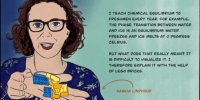
Inspired by nature: new method to separate proteins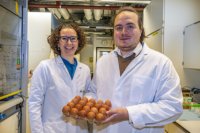
- Plastic membranes to make drinking water – and more

- ‘De zorg voor een stervende moeder komt niet op een cv terecht’

Radio:
- De Grote Vraag | Helpt scheikunde ons af van olie?
- De Optimist: Saskia Lindhoud over vrouwen op de universiteit
Opinion pieces in Newspapers:
- Een cv zonder gat is geen garantie voor kwaliteit
- Wetenschappelijkecarrièremoeders is gebaat bijslimmereselectiecriteria
In the press
- Opening academic year 2017-2018
- Studium Generale: the Beauty of Science
- UT News article about my VENI project
News on utwente.nl
Address
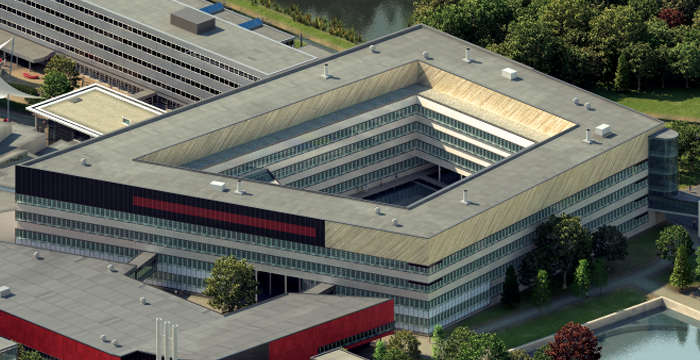
University of Twente
Carré (building no. 15), room C4207
Hallenweg 23
7522 NH Enschede
Netherlands
University of Twente
Carré C4207
P.O. Box 217
7500 AE Enschede
Netherlands

